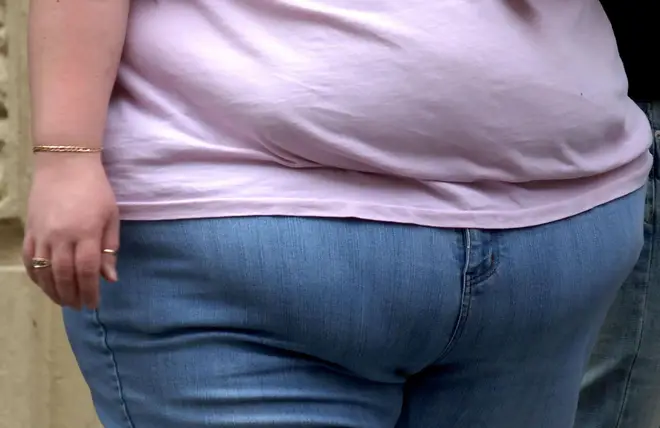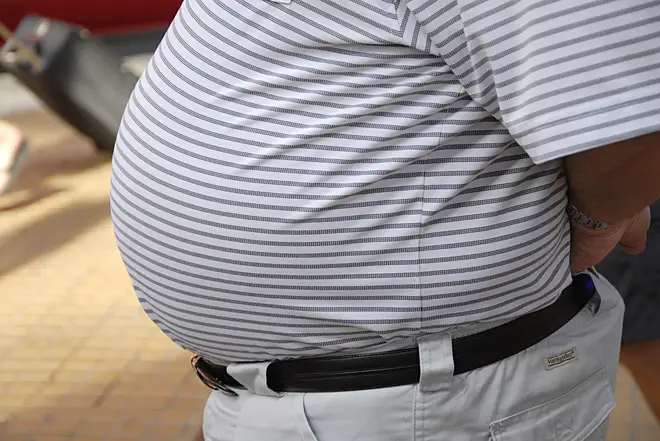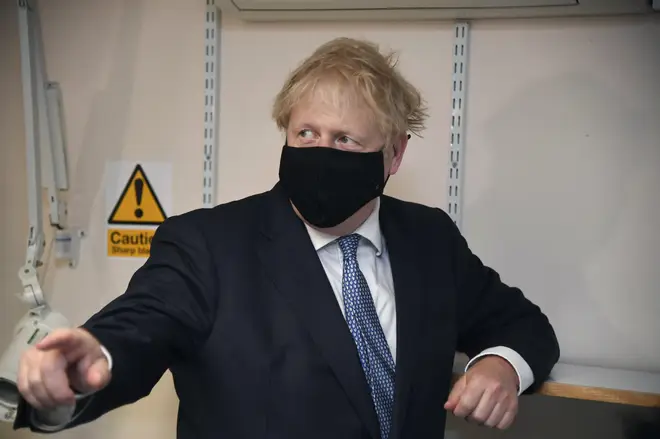
Ben Kentish 10pm - 1am
25 July 2020, 09:16

People who are overweight or obese are being urged to shed the pounds after a new Public Health England (PHE) review found a dramatic rise in the risk of hospitalisation and death from Covid-19.
The public has been snacking more in lockdown and, despite increases in sales of bikes and exercise equipment, overall activity levels appear to have dropped compared to before the pandemic, it said.
The news comes after speculation that the government is looking to ban junk food adverts online and before the watershed in a bid to curb obesity in the UK.
Experts examined existing studies and concluded that people who are overweight, with a body mass index (BMI) of 25 to 29.9, have a higher risk of hospitalisation and poor outcomes if they catch coronavirus.
Meanwhile, having a BMI of 30 to 35 increases the risk of death from coronavirus by 40%, while a BMI over 40 almost doubles the risk compared to people who are a healthy weight.
The report said being overweight or obese increases the chance somebody will end up critically ill in intensive care, with 7.9% of critically ill patients with Covid-19 in intensive care units having a BMI over 40 compared with 2.9% of the general population.

Dr Alison Tedstone, chief nutritionist at PHE, said: "The current evidence is clear that being overweight or obese puts you at greater risk of serious illness or death from Covid-19, as well as from many other life-threatening diseases.
"It can be hard to lose weight and even harder to sustain it, which is why people cannot easily do it on their own.
"Losing weight can bring huge benefits for health - and may also help protect against the health risks of Covid-19.
"The case for action on obesity has never been stronger."
The study pointed out that snack food and alcohol supermarket sales have risen, possibly reflecting the fact shops, pubs and cafes were closed during lockdown and people turned to snacking and drinking at home.
During the first six months of this year, alcohol sales were up 30% on the same period last year, while confectionery sales were up 20% and foods for sweet home cooking rose 22%, the PHE report said.
Meanwhile, a survey of more than 2,000 people for the Food Standards Agency in May found that people were cooking more from scratch but were also snacking on cakes, biscuits, confectionery and savoury snacks more often.

Naveed Sattar, professor of metabolic medicine from the University of Glasgow, and Susan Jebb, professor of diet and population health at the University of Oxford, who peer-reviewed the report, urged people to take action over their weight.
Prof Jebb said "every kilo" people lost was going to reduce their risk of being admitted to hospital with coronavirus.
She added: "It's very clear that being overweight is associated with an increased risk of hospitalisation and also of death, and that those risks are pretty linear.
"I think this has really brought to the fore that obesity is not just the chronic health problem we've always known, but actually is now a more acute issue for people who have Covid."
She said even for people who were only slightly overweight - with a BMI of 25 - it was "worth doing something" to reduce their risk.
She added: "If you're over (BMI) 25, those are the people who ought to be trying to lose weight.
"And if your BMI is already in the healthy range, you need to be avoiding weight gain."
Prof Sattar said one study had shown that compared to a normal BMI, being overweight increased the risk of admission to intensive care by about 50%, rising to more than double the risk for those with a BMI of 30 to 35, and about a four-fold increased risk for those with a BMI over 35.
He added: "I think we mustn't scare people that everybody has a really high risk - it's one risk factor but it's probably the key major modifiable risk factor.
"This pandemic has scared people. If this helps some people improve their lifestyle, make some small, sustainable changes in a positive direction, then I think that's a good thing."
The PHE study found that excess weight does not seem to increase people's chances of contracting Covid-19, but said excess fat can affect the respiratory system and is likely to affect inflammatory and immune function.

Facemask Friday LBC speaks to staff and supermarket customers
Prof Jebb said she hoped the Government's forthcoming plan on tackling obesity would have a two-pronged approach - helping overweight people lose weight, but also "less advertising of foods and less promotion of unhealthy foods".
She added: "It should not be hard to eat healthily and we would help people to do that if we stopped actively encouraging them to eat the wrong things.
"I don't need to be accosted by bars of chocolate when I only got to buy a newspaper.
"It's fine to sell chocolate but don't try to encourage people to purchase it."
She said she would be "really, really pleased" if Boris Johnson said, "obesity is one of the biggest public health problems this country faces".
And she added that if Covid-19 has brought that to the fore "then that is really, really good news".
On Friday, the Prime Minister revealed he has lost weight since being admitted to intensive care with coronavirus, as he encouraged other people to target their own weight.
He said: "I'm on the way, I've lost about a stone and a bit."